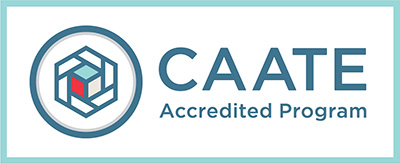Vision, Mission, Goals & Objectives

Vision Statement:
The Moravian University Master of Science in Athletic Training Program will be nationally recognized as a leader in developing autonomous, evidence-based clinician-scholars who serve as leaders in advancing the practice of athletic training.
Mission Statement:
The mission of the Moravian University Master of Science in Athletic Training Program is to provide rigorous didactic and clinical education in order to prepare students to be autonomous, evidence-based clinician-scholars across the full spectrum of athletic training practice in a dynamic healthcare environment. The program provides innovative, inter-professional didactic and immersive clinical education emphasizing critical-thinking, best practice and patient-centered care to produce clinicians who are leaders, lifelong learners and advocates for the athletic training profession.
“
With the support of faculty and peers in the MSAT program, I grew and developed my skills to ultimately become a compassionate and competent athletic trainer dedicated to the well-being of my patients.”
—Haided Estevez '20
Program Goals & Objectives:
Goal 1: Provide students with a learning environment offering the cognitive, behavioral, and psychomotor skills necessary for successful practice as an athletic trainer.
Objective 1.1: Upon completion of the program, the student will demonstrate effective problem-solving and clinical decision-making relative to his/her role as an athletic trainer.
Objective 1.2: Upon completion of the program, the student will demonstrate technical proficiency in skills necessary to fulfill the role of an athletic trainer.
Objective 1.3: Upon completion of the program, the student will demonstrate personal behaviors consistent with professional and employment expectations of an athletic trainer.
Objective 1.4: Athletic training faculty will provide high-quality instruction to students enrolled in the education program.
Goal 2: Provide students with a professional framework promoting leadership, teamwork, compassion, cultural competence, legal and ethical behavior while maintaining high standards in the delivery of healthcare services that meet societal needs while respecting the rights, welfare, dignity and well-being of the patient.
Objective 2.1: Upon completion of the program, the student will demonstrate leadership qualities which serve to enhance the profession.
Objective 2.2: Upon completion of the program, the student will demonstrate a commitment to a team approach to practice.
Objective 2.3: Upon completion of the program, the student will demonstrate the ability to establish and maintain patient relationships based on honesty, respect, compassion, and empathy.
Objective 2.4: Upon completion of the program, the student will demonstrate a commitment to practicing athletic training ethically and legally within the confines of the NATA Code of Ethics, BOC Standards of Practice, national, state, and institutional policies.
Goal 3: Provide students the ability to understand the administrative functions of healthcare managers.
Objective 3.1: Upon completion of the program, the student will develop a plan related to budgeting, finance, cost control and revenue and cost forecasting.
Objective 3.2: Upon completion of the program, the student will formulate strategic planning related to risk management and the legal environment of healthcare, including principles of supervision.
Goal 4: Promote the importance of research, scholarship, and continuing education, and develop strategies for consuming and producing clinical research.
Objective 4.1: Upon completion of the program, the student will become proficient in locating and evaluating medical literature.
Objective 4.2: Upon completion of the program, the student will become proficient in developing and answering focused clinical questions.
Objective 4.3: Upon completion of the program, the student will be able to formulate original research projects in athletic training, including research design, methodology, and statistical analysis.
Objective 4.4: Upon completion of the program, the student will produce original scholarship which will be accepted for publication and/or presentation at a local, regional or national professional meeting.
Objective 4.5: Upon completion of the program, the student will have attended a minimum of 10 hours of professional conferences at local, state, district or national levels.
Goal 5: Students will be able to effectively communicate via oral and written means, including patient education, daily communication, and documentation in medical records, with a variety of patients, caregivers, peers, preceptors, supervisors and other healthcare professionals.
Objective 5.1: Upon completion of the program, the student will demonstrate effective communication skills with patients, caregivers, family members, and support personnel.
Objective 5.2: Upon completion of the program, the student will demonstrate effective communication skills with peers, preceptors, supervisors and other healthcare professionals.
Objective 5.3: Upon completion of the program, the student will demonstrate effective medical documentation skills, including use of paper and electronic medical record systems.
Goal 6: Students will be prepared to transition to autonomous practice through exposure to high-quality clinical education with inspired preceptors who provide authentic, real-time patient interactions across a variety of patient populations and athletic training employment settings.
Objective 6.1: Upon completion of the program, students will be prepared to transition to autonomous practice.
Objective 6.2: Clinical education sites will provide students with authentic, real-time patient interactions.
Objective 6.3: Clinical education sites will provide students with exposure to a variety of patient populations and athletic training employment settings.
Objective 6.4: Preceptors will provide high-quality instruction to students enrolled in the education program.
Objective 6.5: Clinical Education Sites will provide high-quality learning environments to students enrolled in the education program.

